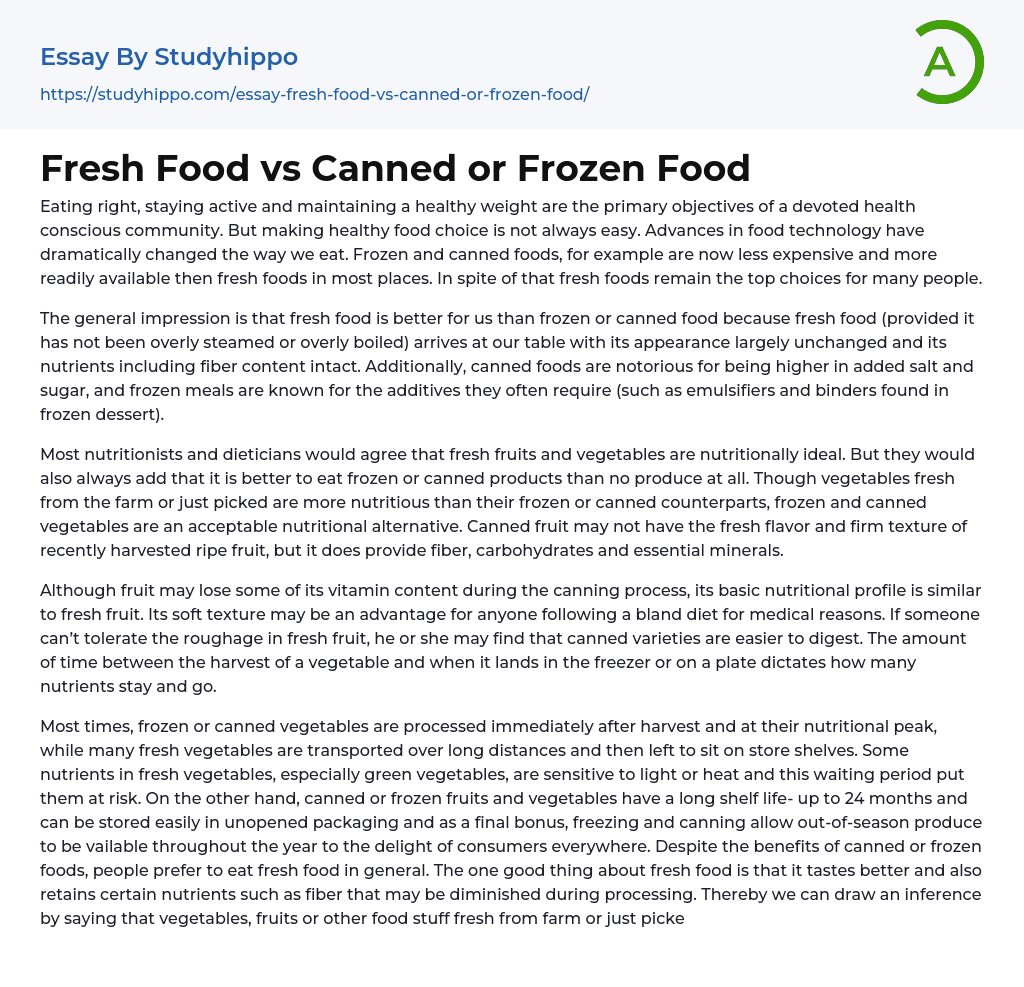Eating right, staying active and maintaining a healthy weight are the primary objectives of a devoted health conscious community. But making healthy food choice is not always easy. Advances in food technology have dramatically changed the way we eat. Frozen and canned foods, for example are now less expensive and more readily available then fresh foods in most places. In spite of that fresh foods remain the top choices for many people.
The general impression is that fresh food is better for us than frozen or canned food because fresh food (provided it has not been overly steamed or overly boiled) arrives at our table with its appearance largely unchanged and its nutrients including fiber content intact. Additionally, canned foods are notorious for being higher in added salt and sugar, and frozen meals are known for the additiv
...es they often require (such as emulsifiers and binders found in frozen dessert).
Most nutritionists and dieticians would agree that fresh fruits and vegetables are nutritionally ideal. But they would also always add that it is better to eat frozen or canned products than no produce at all. Though vegetables fresh from the farm or just picked are more nutritious than their frozen or canned counterparts, frozen and canned vegetables are an acceptable nutritional alternative. Canned fruit may not have the fresh flavor and firm texture of recently harvested ripe fruit, but it does provide fiber, carbohydrates and essential minerals.
Although fruit may lose some of its vitamin content during the canning process, its basic nutritional profile is similar to fresh fruit. Its soft texture may be an advantage for anyone following a
bland diet for medical reasons. If someone can’t tolerate the roughage in fresh fruit, he or she may find that canned varieties are easier to digest. The amount of time between the harvest of a vegetable and when it lands in the freezer or on a plate dictates how many nutrients stay and go.
Most times, frozen or canned vegetables are processed immediately after harvest and at their nutritional peak, while many fresh vegetables are transported over long distances and then left to sit on store shelves. Some nutrients in fresh vegetables, especially green vegetables, are sensitive to light or heat and this waiting period put them at risk. On the other hand, canned or frozen fruits and vegetables have a long shelf life- up to 24 months and can be stored easily in unopened packaging and as a final bonus, freezing and canning allow out-of-season produce to be vailable throughout the year to the delight of consumers everywhere. Despite the benefits of canned or frozen foods, people prefer to eat fresh food in general. The one good thing about fresh food is that it tastes better and also retains certain nutrients such as fiber that may be diminished during processing. Thereby we can draw an inference by saying that vegetables, fruits or other food stuff fresh from farm or just picked are more nutritious than their frozen or canned counterparts, while frozen or canned foods offers a healthy alternative to the fresh varieties.
- Food Safety essays
- Food Security essays
- Beverages essays
- Cuisines essays
- Dairy essays
- Desserts essays
- Fast Food essays
- Bread essays
- Meal essays
- Meat essays
- Organic Food essays
- Rice essays
- Sugar essays
- Taste essays
- Beef essays
- Coconut essays
- Crowd essays
- Dinner essays
- Juice essays
- Sainsbury essays
- Cooking essays
- Ginger essays
- Oreo essays
- Drink essays
- Beer essays
- Wine essays
- Coffee essays
- Tea essays
- Cake essays
- Hamburger essays
- Ice Cream essays
- Burger essays
- Pizza essays
- Fruit essays
- Lemon essays
- Food Waste essays
- Favorite Food essays
- Alcoholic essays
- Soft Drinks essays
- Cookie essays
- Starch essays
- Yeast essays
- Cola essays
- Pizza Hut essays
- snack foods essays
- chips essays
- Biscuit essays
- Brewing essays
- Brewery essays
- Anorexia essays




